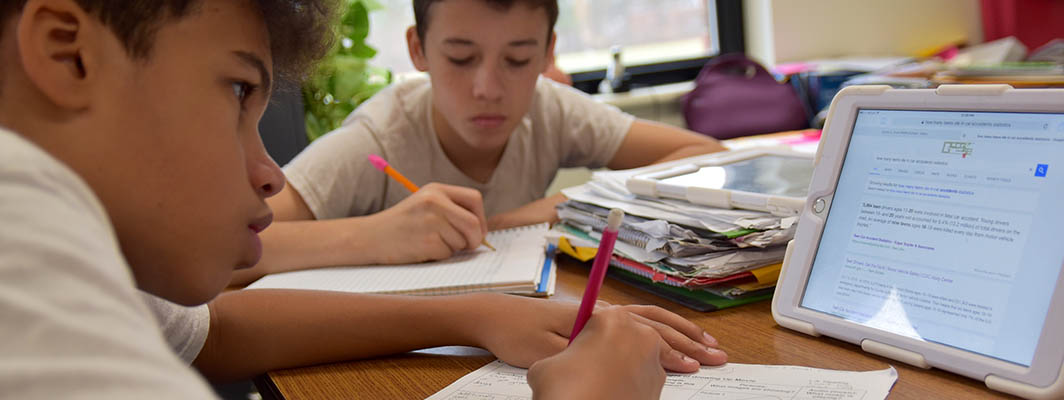
Such was the case at Timilty Middle School in Roxbury, Massachusetts, one of 100 Verizon Innovative Learning schools (VILs) around the country. Some seventh graders at Timilty were not engaged in the lessons teachers planned with iPads and were off task, or choosing to surf the internet instead. Others were simply not bringing them to class at all, leading to frustration among their teachers.
“It was this double-edged sword where they were using their devices inappropriately or they just weren’t bringing them to class because they didn’t see the need to bring them to class. [The tablets] weren’t being used because the teachers were seeing the misbehavior,” said Christina DiPietro, the VILs instructional coach at Timilty. “It kind of came to a head when the seventh grade team was holding onto the students’ iPads, so I saw that there was a real need to address it.”
Instead of unilaterally putting a policy in place, DiPietro collaborated with seventh grade science teacher Eggy Alper to devise a solution. Together they developed a special iPad plan for those students who misused their devices, creating a contract with the student and the parent.
“We’d be a united force with her and me and the student and the family,” DiPietro said. “I think she really appreciated having some input into the plan—she really liked my ideas and added a couple of her own. It really breathed new life into [the program].”
With the new policy in place, DiPietro and Alper began focusing on meaningful activities on the iPads that engaged the students, using apps like Nearpod and Quizlet—where the students have an interactive virtual experience..
“Instead of it just being a replacement for paper, we worked on lesson plans based on a specific app that’s engaging for the students,” DiPietro explained. “She saw not only an uptick in students bringing the iPads fully charged to her class because it was a necessity, but also a decline in the number of students who were off-task using the iPads, because she was now incorporating things that the kids were interested in and also didn’t leave a whole lot of room for not participating in the lesson.”
For example, students can look at 3D images on the iPad. “As a science teacher, it’s very hard to bring certain things to the classroom,” Alper explained. “But if I have an app that shows the heart, you can see the heart from all angles, just by playing with your fingers.”
As the students became more comfortable using the apps, Alper was able to give them options and let them choose themselves how to complete assignments. “She’s giving them choices and it’s happening more organically now because the students have been engaged and used so many different apps,” DiPietro said. “The kids are rising to the challenge.”
Alper also began to feel more confident using technology as she continued her sessions with DiPietro and became more familiar with the tools she had at her disposal. Having a knowledgeable Coach who can help educators use the right app or tool to enhance a lesson is very important.
“Ms. DiPietro has been a very good resource for me,” she said. “I float ideas to her and she researches them. For example, when students didn’t respond well to an app, I went to her and told her my idea and she right away gave me a list of apps that I didn’t have before. Now I just go to her list and find the right app.
“I see myself growing in the technology field,” Alper continued. “I didn’t grow up with computers, but [DiPietro]’s patient with me and she doesn’t mind repeating things. She’s always there and makes me feel like I can do this.”
Alper’s success has had a positive impact beyond her own classes, as other members of the seventh grade team have seen what can happen if they use the iPads for engaging lessons. “They’re feeding off her energy, and it’s just been this ripple effect—the kids are bringing their iPads, they’re asking to do more engaging activities in other classes, and I think that’s motivating the other teachers,” DiPietro said.
Coaches like DiPietro play a very important role in helping teachers learn to design engaging lessons for powerful technology use in the classroom. They are a key element to the VILs program. In Timilty’s case, a collaborative solution to challenges faced by the seventh grade teachers was sparked by one teacher changing her practice, inspiring her peers and engaging students.
Learn more about the Verizon Innovative Learning schools initiative at verizon.digitalpromise.org.